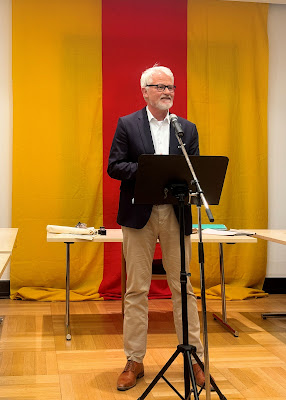
|
| Click to enlarge |
Andreas Meckel from the
Initiative zur Erinnerung an die Badische Revolution von 1848/49
(Initiative for the Remembrance of the Baden Revolution of 1848/49) staged the
trial from the court records and made sure that the performance took place
precisely 175 years later to the day.

|
|
District President and hostess
Bärbel Schäfer
welcomes the visitors. to the historic Basler Hof. |
Back then, the courtroom in the Basler Hof was filled to capacity, as it was yesterday, but it was considerably smaller than the original. While the court in 1849 consisted of five judges and twelve jurors, i.e., mayors, farmers, and craftsmen, Andreas had reduced the scene's size due to the limited space available.
To the judge's right, defense attorney Lorenz Brentano (Burkhart Wein), lawyer and regional chairman of the Baden People's Association, talks to the defendant Gustav Struve (Oliver Genzow), accused of attempted high treason.
The man who had called for a jury in his 13 Demands of the People* was now the first citizen of Baden to stand before one himself.
*Art.11: We demand laws worthy of free citizens and their application by juries
The public Prosecutor Eimer (Peter Haug-Lamersdorf) reads out the indictment:

|
|
It needed Lars Petersen, City council and judge at the Freiburg
district court, to explain the complicated legal situation at the time |

|
|
Gustav clearly enjoyed speaking to the audience, where his idea of a republic received much applause. |
- by the three decades of continued undermining of constitutional conditions in Germany;
- by the unheard-of pressure with which the people had been burdened;
- by the will of the people;
- by the state of emergency in which the republican party had been placed as a result of the government's measures and
- by the purest intentions, the love for the fatherland, freedom, and rights, which had guided him in all his endeavors.
*From Struve's memoirs: Geschichte der drei Volkserhebungen in Baden, Verlag von Jenni, Sohn, Bern 1849
As in 1849, the onlookers in the courtroom mostly stood by the defendant. When
heckling got out of hand, the judge threatened to have the courtroom cleared.
Gustav went back in history and taught the audience: "What I did, I did out of full, deep conviction; I was not driven by ambition, but by the love of my country and a sense of freedom. I did it with Tell, Washington, and the heroes of the French Revolution in mind. They all resisted the tyrants of the earth following the laws of providence; even if their undertakings often failed at first, they ultimately won the victory. Egmont and Horn were executed, thousands languished in Alba's dungeons, but the victory remained with the Dutch republicans."
In contrast to today's code of criminal procedure, the jury members in Freiburg were the only ones called upon to determine the guilt of the accused, while the judges had to choose the sentence.
This led to a curious situation when the jurors answered 26 questions formulated by the court on guilt in writing with a yes or no.
Six questions concerned Struve's involvement in the April Uprising of 1848, while ten of the remaining 20 questions related to Struve's and Blind's actions during the September Uprising. For example, the jury had to decide whether the charges, such as the theft of public funds, had been proven.

|
| No, because it happened in the course of the revolution (©regiopen journals) |
Of the ten questions about Struve and the September Uprising, six were answered in the negative, such as the question: Is the defendant Gustav Struve guilty of having subsequently, for the purpose of [...] introducing the republic as a form of government in Germany, entered the town of Lörrach on September 21 of the previous year with a band of armed persons [...] and proclaimed the republic as the immediately introduced form of government?
In the end, four questions were answered in the affirmative. The jury, therefore, considered it proven that Struve had arranged to join Karl Blind and others in the September 1848 uprising. Were the jurors inclined towards the defendants' liberal ideas by denying most of the other apparent facts?
After a brief interruption of the trial, prosecutor Eimer requested that the court declare Gustav Struve and Karl Blind guilty of attempted high treason and sentence them to eight years in prison.
The court considered the attempted high treason to be proven by the four
charges that were considered by the jury and thus followed the prosecution's
request.

|
| The ruling (©regiopen journals) |
Struve and Blind were transferred to Rastatt on April 2, 1849, and soon moved to the prison in Bruchsal.

|
| In the end, a big applause for the radiant author Andreas Meckel. |

|
|
Then Olaf Creutzburg took his guitar and stroke up the well-known
Die Gedanken sind frei (Thoughts are free), to which the audience sang along |
Lagniappe
Struve was indispensable as the democratic pioneer but did not cover himself in glory as a troop commander. At the time, Theodor Mögling, an active participant in the Baden Revolution, wrote to Emma Herwegh, "I am only glad that the Baden government has caught Struve. This is a real stroke of luck because Struve would have caused us even more damage. In this way, he benefits us as a martyr but can do us no harm."
Really? Struve and Blind were liberated by revolutionaries in Bruchsal on the night of May 13/14, 1849, at the beginning of the third Baden uprising.






I'm thankful for the thoughtful and depth you bring to your writing. It's truly enriching. Discover strategies and tactics shared by top Aviator players on our blog.
ReplyDelete